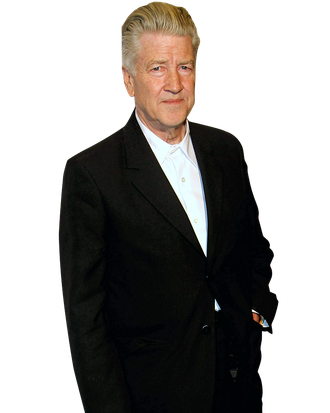
David Lynch is best known as the macabre surrealist behind Blue Velvet, Lost Highway, Mulholland Drive, and the cult television series Twin Peaks. But the award-winning filmmaker has long spread his artistic talents across multiple forms, including painting, lithographs, and furniture design. He is also a “non-musician” who just unleashed two new projects: a dreamy pop album with Chrysta Bell entitled This Train, which he produced and co-wrote; and his first official solo album, Crazy Clown Time, which encompasses everything from off-kilter electro-pop to twangy, Duane Eddy–style rock. We spoke with Lynch ahead of today’s release about his influences, his “magical” music-writing process, and fifties nostalgia.
Why do a solo album now?
It just happened. I’m working with Dean [Hurley, his producer]. I get the credit for a solo album. I get to think that I made all the decisions.
Your film composer Angelo Badalamenti has said that during your film-scoring process, you would not let him see any scenes before he started composing, but rather you would describe the characters and what was going on in the film.
I sit next to him on the bench. I like to sit very close to Angelo. He’s very warm, and he plays my words. It’s a very beautiful thing.
Does Dean have a similar way of coaxing sounds out of you?
Dean knows what I like: He records the guitar in a certain way that gets a certain kind of sound that I like, and he’ll tune the drums and get a sound that I like on that. Usually on the jams now he plays drums and I play guitar, and we start off a lot of times like the same-old-same-old. But if you keep jamming, depending upon the sounds coming out, a magical thing starts happening and the thing starts to cook in a beautiful way. Things are discovered. Variations on a theme come. Sometimes a magical thing happens: We find something that we consider new or really good, and that becomes the next song. There were happy accidents occurring in probably most of these songs.
Can you give a specific example?
Here’s one: We were working on “Speed Roadster” — there is just something about every time you light up the guitar, it’s a little bit of a different sound, even if you have it set up in a certain way. On this particular night, the guitar just had this certain sound, and it caused me to play in a certain way. And out came “Speed Roadster.” And then after the music was done, the lyrics were born out of that sound. It just happened.
I definitely sense a Duane Eddy influence, with the twangy and shimmery guitar sounds. Did you listen to him a lot as a child?
I love Duane Eddy.
Do you recall when you first heard him, when that sound was brand-new?
Where I lived, Elvis was the first to say a new thing, the birth of rock and roll. I might’ve heard “Rock Around the Clock,” but really Elvis was the first giant change, and that’s where the new thing was, all the new power. It was phenomenal. It just was so major a change; I don’t know that we really appreciate how great it was, how fantastic it was. Then Duane Eddy, Gene Vincent, and all these people came and instantly recognized a new thing. They knew it, and they wanted to play it too. It gave everybody such a thrill. They recognized it and were just euphoric over it.
You grew up in the fifties, and all of your work seems to be done through a fifties prism. Would you agree that era is still a big influence?
Oh yeah. When you’re a kid, they say the window is wide open, and you take in things. Those things stay with you for the rest of your life: the music of that time, the smells, the look of the trees, the cars, the feeling of your living room rug. Every bit of detail stays with you in a real special way, and it can be an influence. It’s not the only influence, but it’s an influence.
Do you miss that era?
I miss what I call a fifties dream: slow dancing in the basement with a girl with a really soft sweater and these budding breasts. Then a slow kiss in the dark in the basement with certain music playing. You know, it doesn’t get much better than that.
I grew up in the eighties, so I can only imagine.
You didn’t slow dance with a girl in the eighties?
I was a metalhead.
That’s a disaster with a girl then.
You’ve talked previously about how in the fifties, we were unknowingly headed for disaster. So it’s not all good.
[In the fifties], everybody was spraying their garden with the strangest stuff, and it just seemed like it was completely natural … this thing with DDT. It just seemed like, of course nothing could go wrong with it. It was a new advancement. And yet all these things that came from scientific advancement, now millions of people have died from it and suffered big-time. It was all started then, and it didn’t really register until later down the line.
I’ve heard a rumor that there is going to be a sequel to Mulholland Drive. Is that true?
That’s a rumor.
So what is next for you in film or TV?
I’m trying to catch ideas for the next film. Nothing’s happening yet.




